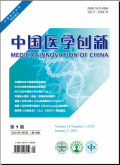中国医学创新2024,Vol.21Issue(10):11-15,5.DOI:10.3969/j.issn.1674-4985.2024.10.003
青黛对炎症性肠病TGF-β1/Smad 3信号通路相关分子表达的临床研究
Clinical Study of Qingdai on the Expression of Molecules Related to TGF-β1/Smad 3 Signaling Pathway in Inflammatory Bowel Disease
摘要
Abstract
Objective:To explore the clinical effect of Qingdai on the expression of TGF-β1/Smad 3 signaling pathway related molecules in inflammatory bowel disease.Method:A total of 80 patients diagnosed as ulcerative colitis or Crohn's disease in the Second People's Hospital of Jingdezhen from January 2021 to January 2023 were selected and divided into the observation group and the control group according to the random drawing method,with 40 patients in each group.The control group was treated with routine treatment,while the observation group was treated with Qingdai on the basis of conventional treatment.The treatment was continued for 2 months,the clinical efficacy,TGF-β1/Smad 3 expression,immune function and adverse reactions were compared between the two groups.Result:The total effective rate in the observation group was 90.00%,which was significantly higher than 60.00%in the control group,the difference was significant(P<0.05).Before treatment,there was no significant difference in the expression of TGF-β1/Smad 3 between the two groups(P>0.05).After treatment,the expressions of TGF-β1/Smad 3 protein and mRNA in the two groups were higher than those before treatment,and those in the observation group were higher than those in the control group,the differences were significance(P<0.05).After treatment,CD3+ and CD4+ levels were higher than before treatment,CD8+ levels were lower than before treatment,and CD3+ and CD4+ levels in the observation group were higher than those in the control group,and CD8+ levels was lower than that in the control group,the differences were significant(P<0.05).The total incidence of adverse reactions in the observation group and control group were 10.00%and 20.00%respectively,there was no statistical difference(P>0.05).Conclusion:Qingdai can improve the clinical efficacy by repairing TGF-β1/Smad 3 signal pathway in patients with inflammatory bowel disease,which has high clinical value.关键词
青黛/炎症性肠病/TGF-β1/Smad 3信号通路Key words
Qingdai/Inflammatory bowel disease/TGF-β1/Smad 3 signaling pathway引用本文复制引用
胡招兵,潘华,贾志红..青黛对炎症性肠病TGF-β1/Smad 3信号通路相关分子表达的临床研究[J].中国医学创新,2024,21(10):11-15,5.基金项目
江西省中医药管理局科技计划项目(2022A073) (2022A073)

